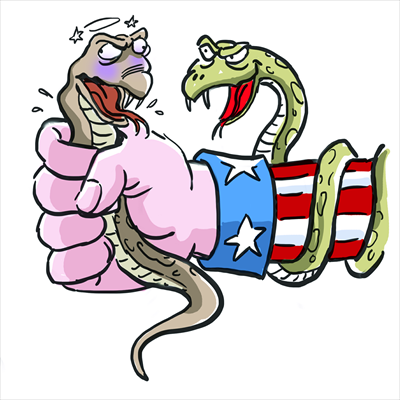Boston bombing could end double standards on terror

The Boston Marathon bombings on April 15 prove the US war on terrorism is far from over. Despite the direct losses being far less than 9/11, the bombings shook the US people's confidence in national security. The bombings will spark a debate even within the US on its double standards in fighting against terrorism, and bring a far-reaching global impact.
For a long time, Chechen terrorists have been considered enemies only of Russia. But in the bombings, the two suspects were identified as Chechen immigrants. The motives of the two suspects are unknown yet, but no doubt the big surprise behind the tragedy is more or less a result of US double standards on terrorism.
After the 9/11 attacks, both Russia and China stood with the US on the war against terrorism, but before long they differed on how to define terrorism and how to fight against terrorism.
The terrorist groups are not united. They are diversified and target different main enemies. For the US, the sole power enjoying global leadership, it faces terrorism threats from overseas and it fights against terrorism actually only for the sake of its own and its allies' safety.
As to Chechen separatists and Eastern Turkistan activists, the big headaches for Russia and China respectively, the US always takes two approaches.
On the one hand, the US defined some Chechen separatists as terrorist entities. On the other hand, the US often blamed the Russian government's violation of ethnic groups' human rights.
Russian official media and scholars criticized the US for supporting Chechen separatists in order to compete to control the Caspian Sea oilfields and pipelines, and weaken Russian dominance in Central Asia.
The US does the same to the Xinjiang separatists. The US has only put the Eastern Turkistan Islamic Movement, one of about 50 Eastern Turkistan groups, on its terrorist list. On the other hand, it praises separatist head Rebiya Kadeer as a "prominent human rights advocate" and finances her group. Such double standards are often interpreted as making trouble to contain China's rise, while hitting the most dangerous group that is most closely linked to Al Qaeda.
The Boston bombings provide a rare opportunity for the US and Russia to get closer on how to deal with Chechen terrorists.
On Friday evening US President Barack Obama talked with Russian President Vladimir Putin by phone about the bombings. Obama thanked Putin for offering help on the investigation. In the near future, with national security as top priority, the US may be more cooperative with Russia on Chechen terrorists as the possibility that the terrorists there have already taken the US as a target can't be ruled out.
But will this also bring an end to US double standards on the fight against Eastern Turkistan activists? Probably no.
When it talks about cooperation with other big powers, the US National Security Strategy always puts Russia behind China, and even behind India. For the US, China is now a more important strategic power to deal with than Russia. Hence the US change on Chechen terrorists can better serve its top priority since Russia's strategic significance is declining.
China is in a different case. Before it can trace any hints that the Xinjiang separatists may attack the US, the US will not easily abandon these troublemakers in its attempts to slow China's rapid development and expanding power projection.
Furthermore, whether the Afghan government can exert effective governance after the US pulls out its troops from Afghanistan by 2014 will be a big question. The US wars in Afghanistan and Iraq will cost taxpayers $4 trillion to $6 trillion, according to a Harvard study in late March. The US can no longer maintain its astronomical costs in Afghanistan, given the US is on the verge of the fiscal cliff.
However, the US is afraid the Taliban will restore strength and may be a bigger threat to the US. The US media's sensational proposal that China will fill up the vacuum and gain the benefits to exploit Afghanistan's mineral resources without being involved in the war or providing huge aid is a trap to seduce China to bear the financial and military burdens of preventing the revival of terrorism in Afghanistan.
The Xinjiang separatists' close links with terrorists in Afghanistan do put China in a dilemma, and the US will continue to make use of the dilemma to push China to take over the burdens.
While it's hard for the US to drop double standards on Xinjiang separatists, it may be more cautious in the ongoing civil war in Syria, where it has contradictory goals.
To overthrow Syrian President Bashar al-Assad, Iran's only ally in the Middle East, will pave the way for the US to strike Iran. However, the Chechens' joining in the Syrian rebellion will make the US more hesitant to arm rebels, especially since the leader of the Al-Nusra Front has already pledged loyalty to Al Qaeda. The Syrian war will be more long-lasting than expected.
The author is an independent observer on international affairs. opinion@globaltimes.com.cn